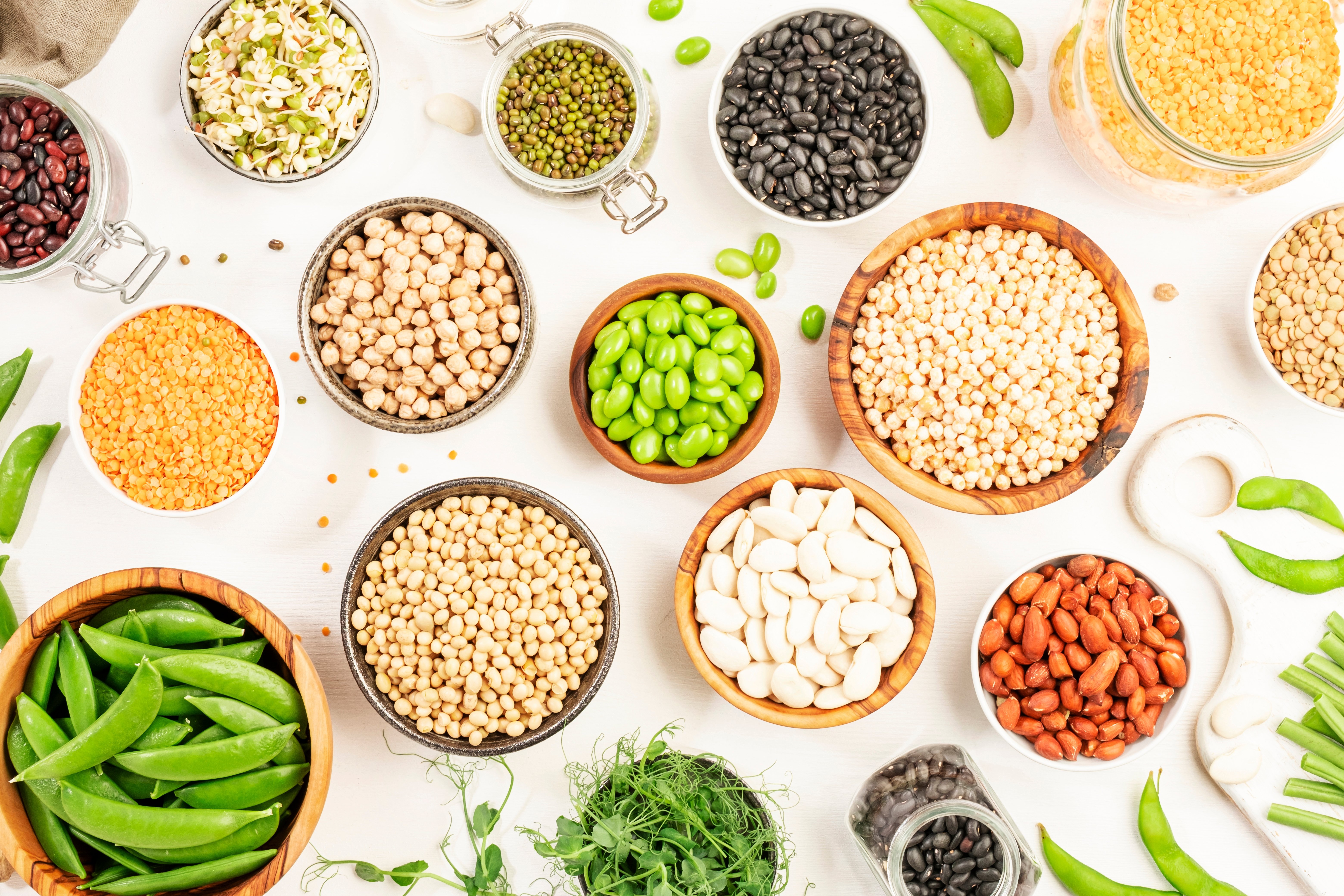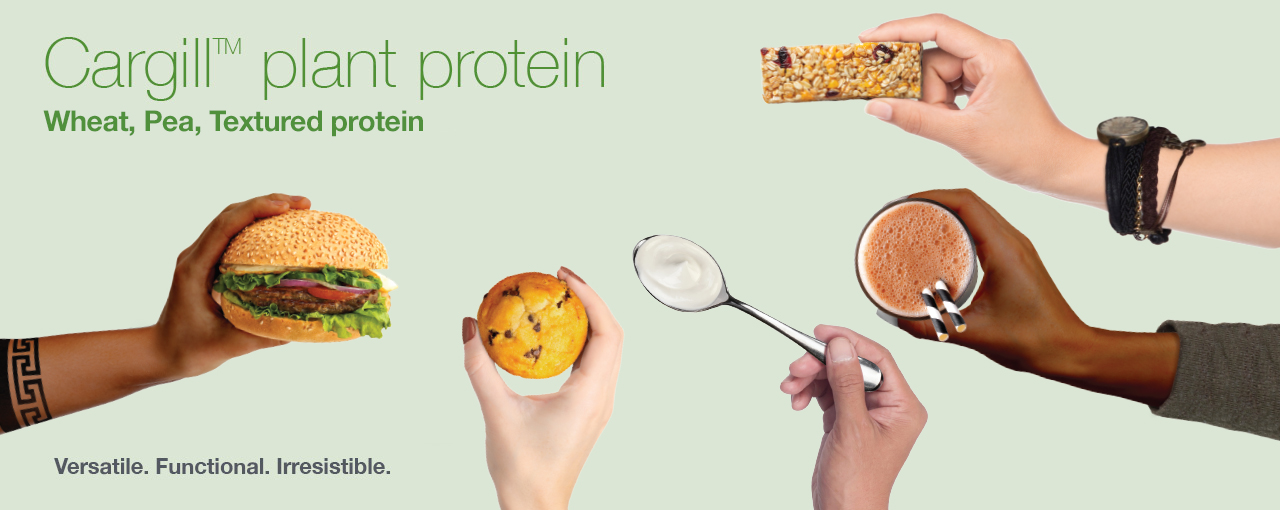Plant proteins
Cargill plant protein solutions satisfy consumers' hunger for protein-enriched plant-based and label-friendly foods and drinks
 There’s no doubt about it - plants have all the goods. Plant-based eating has become a prevalent dietary style. A diet high in plant foods can offer a wide range of nutrients and health benefits, as well as deliver a sustainability profile more preferred by consumers in EU.
There’s no doubt about it - plants have all the goods. Plant-based eating has become a prevalent dietary style. A diet high in plant foods can offer a wide range of nutrients and health benefits, as well as deliver a sustainability profile more preferred by consumers in EU.
We can help food & beverage manufacturers match protein choices to brand goals, resulting in a new generation of products that meet the diverse needs and desires of today’s more discerning consumer. Whether for breakfast, lunch or dinner, our proteins enable your food & beverage products to have a fixed place in consumers’ kitchens, on their tables or even on the go.
Cargill™ plant protein can help achieve textures, mouthfeel and appealing protein contents by delivering a variety of versatile, label-friendly protein, that support you building products consumers will return to again and again.
Main benefits
1. Label-friendly and functional
Cargill’s cost-competitive plant proteins help formulators achieve consumer-pleasing taste and mouthfeel, with enhanced nutritional profiles. In today’s marketplace, our familiar, plant-based and sustainably grown protein ingredients appeal to consumers seeking label-friendly protein-enriched foods and beverages. All our protein solutions boast a robust protein content and are compatible with vegetarian/vegan diets.
Satisfying and nourishing, protein's functional benefits are being leveraged in virtually all major food and beverage categories. They can contribute to texture, machinability, shelf life and more - making them a valuable addition to product formulas.
2. Healthy and nutritional
With many benefits, it is no surprise consumers want to add protein to their diet, and manufacturers want to include them in their recipes.
Healthy and nutritional
With many benefits, it is no surprise consumers want to add protein to their diet, and manufacturers want to include them in their recipes.
In the EU, three health claims* can be considered for proteins**:
- Protein contributes to the maintenance of normal bones
- Protein contributes to growth in muscle mass
- Protein contributes to the maintenance of muscle mass
In the EU, three nutrition claims related to protein may be possible, depending on the quantity***:
- Source of protein: A claim that a food is a source of protein, and any claim likely to have the same meaning for the consumer, may only be made where at least 12% of the energy value of the food is provided by protein.
- High protein: A claim that a food is high in protein, and any claim likely to have the same meaning for the consumer, may only be made where at least 20% of the energy value of the food is provided by protein
- Increased protein: A claim stating that the content in one or more nutrients, other than vitamins and minerals, has been increased, and any claim likely to have the same meaning for the consumer, may only be made where the product meets the conditions for the claim ‘source of’ and the increase in content is at least 30% compared to a similar product.
* Commission Regulation (EU) No 432/2012 of 16 May 2012 establishing a list of permitted health claims made on foods.
** This information is not intended to be legal advice and may not be relied upon as such.
These claims may be used only for food which is at least a source of protein as referred to in the claim SOURCE OF PROTEIN as listed in the Annex to Regulation (EC) No 1924/2006.
***Nutrition claims are only permitted if they are listed in the Annex of Regulation (EC) No 1924/2006, last amended by Regulation (EU) No 1047/2012.
Nutrition claims
In the EU, three nutrition claims related to protein may be possible, depending on the quantity***:
- Source of protein: A claim that a food is a source of protein, and any claim likely to have the same meaning for the consumer, may only be made where at least 12% of the energy value of the food is provided by protein.
- High protein: A claim that a food is high in protein, and any claim likely to have the same meaning for the consumer, may only be made where at least 20% of the energy value of the food is provided by protein
- Increased protein: A claim stating that the content in one or more nutrients, other than vitamins and minerals, has been increased, and any claim likely to have the same meaning for the consumer, may only be made where the product meets the conditions for the claim ‘source of’ and the increase in content is at least 30% compared to a similar product.
***Nutrition claims are only permitted if they are listed in the Annex of Regulation (EC) No 1924/2006, last amended by Regulation (EU) No 1047/2012.
3. Sustainability
 Sustainably sourced corn and wheat
Sustainably sourced corn and wheat
We work towards the creation of a more sustainable crop supply for our ingredients, including wheat. Our sustainably sourced wheat in Europe is externally verified and benchmarked Silver level according to the SAI Platform’s Farm Sustainability Assessment (FSA). This industry-recognized system supports good agricultural practices in key sustainability areas, including soil conservation, biodiversity conservation and water quality.
Our ingredient offer:
In EMEA today, we offer wheat and pea protein to raise nutritional profile by means of protein fortification and for their functional properties. Consumer attitudes toward pea and wheat are positive, with pea protein nowadays being widely recognized and accepted protein and a still rising star.
Pea Protein
Cargill pea proteins help meet the functional and sensory requirements in emerging applications, including alternative proteins. We offer solutions rich in quality protein, mild in flavor, that don't need an allergen declaration in EU.
Textured Protein
Taking textured proteins to a new level: Cargill's™ plant protein TEX PW80 M. Uniquely obtained from pea and wheat, enabling functionality and meat-like texture, bite and chew to be better achieved.
Wheat Protein
Cargill’s wheat proteins are affordable, plant-sourced proteins that provide functional & nutritional benefits too. They can be easily incorporated into a wide variety of food applications thanks to their neutral flavor profile.
Some Cargill products are only approved for use in certain geographies, end uses, and/or at certain usage levels. It is the customer's responsibility to determine, for a particular geography, that (i) the Cargill product, its use and usage levels, (ii) the customer's product and its use, and (iii) any claims made about the customer's product, all comply with applicable laws and regulations.

